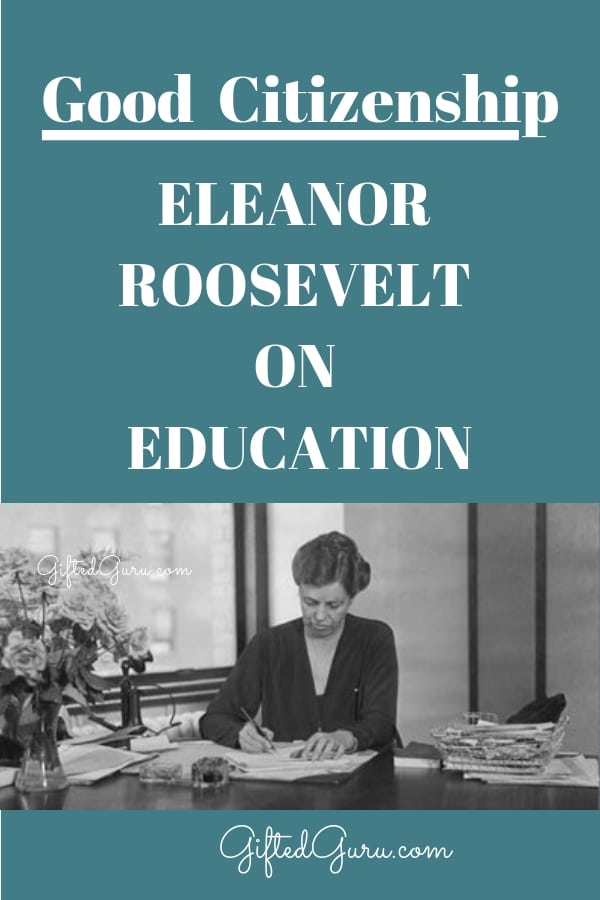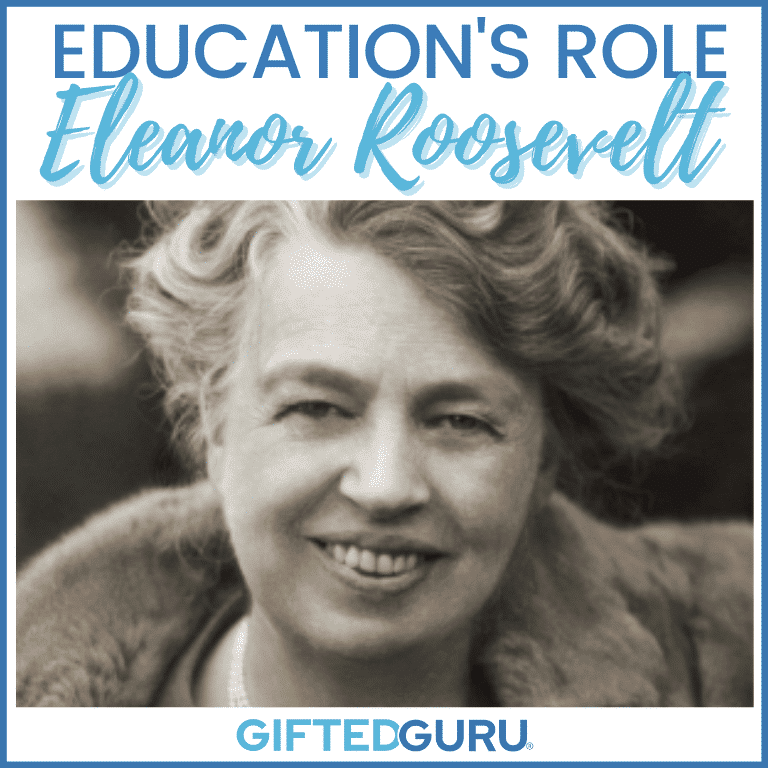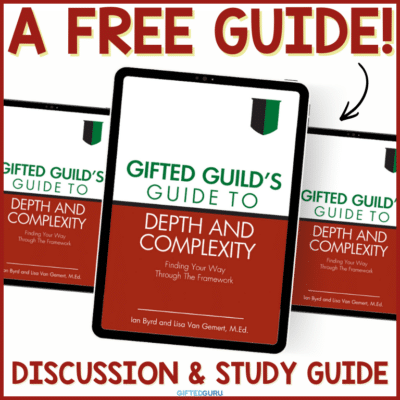Not long ago I tweeted out a quote from Eleanor Roosevelt. Deciding to find the full text of the speech, I went hunting. I thought it was well worth sharing because it is so timely and so provocative.
It’s also very difficult to find in full text, and I’m sharing it as a way to preserve it. If you teach evaluating argument (AP Lang) or non-fiction text, I think this would make a great piece for students to analyze (perhaps a part of it for younger grades).
I’m publishing her article without comment here, and I’ll comment in my next article.
Good Citizenship: The Purpose of Education by Eleanor Roosevelt
Originally Published in the Pictorial Review in April, 1930.
What is the Purpose of Education
This question agitates scholars, teachers, statesmen, every group, in fact, of thoughtful men and women. The conventional answer is the acquisition of knowledge, the reading of books, and the learning of facts.
Perhaps because there are so many books and the branches of knowledge in which we can learn facts are so multitudinous today, we begin to hear more frequently that the function of education is to give children a desire to learn and to teach them how to use their minds and where to go to acquire facts when their curiosity is aroused.
Even more all-embracing than this is the statement made not long ago, before a group of English headmasters, by the Archbishop of York, that “the true purpose of education is to produce citizens.”
If this is the goal—and in a democracy it would seem at least an important part of the ultimate achievement—then we must examine our educational system from a new point of view.
I am going to ask you to go back with me for a minute some thirty years or more and think of the changes wrought by the last few years.
Theodore Roosevelt’s Example
At that time Theodore Roosevelt’s example was for the first time awakening in many young men of America the feeling that their citizenship meant a little more than the privilege of living under the Stars and Stripes, criticizing the conditions of government and the men responsible for its policies and activities, enjoying such advantages as there might be under it, and, if necessary, dying for it in a war which they had had no share in bringing on or in trying to avert.
Theodore Roosevelt was teaching by precept and example that men owed something at all times, whether in peace or in war, for the privilege of citizenship and that the burden rested equally on rich and poor.
He was saying that, no matter what conditions existed, the blame lay no more heavily on the politician and his machine controlling city, State, or nation, than on the shoulders of the average citizen who concerned himself so little with his government that he allowed men to stay in power in spite of his dissatisfaction because he was too indifferent to exert himself to get better men in office.
So young men of all kinds were hearing of a “service” which did not mean being a sailor or a soldier, a doctor or a minister, the only professions in which the word “service” had heretofore had a meaning!
Thus began to be spread abroad the idea that “a service” was owed to the country in peace, and that this could only be rendered satisfactorily when every citizen took an interest in good government.
Education for Women
As girls went in those days, I suppose my own education was fairly typical, and I confess with some shame that at the age of twenty, when asked by an Englishwoman how our government functioned, I was as completely floored as if she had asked me to describe the political events on the moon!
I had heard the men in the family mention political happenings, but it was not a subject of general or frequent conversation in our presence.
Women did not vote and were not expected to be interested. Besides there was something dark and sinister about politics, and it was more respectable not to know politicians or political methods too well.
Business might necessitate some dealings with these rather inferior and nefarious beings, but the general attitude of the righteous was like that of a high-minded and upright citizen of New York City who once remarked to me that a certain political organization was undoubtedly corrupt, but he preferred (tho belonging to an opposite political party) to keep this wicked organization in power as “you paid for what you wanted and were sure to get it, whereas reform administrations were not so reliable in this ability to ”deliver the goods’!”
I do not think I am unfair in saying that in most secondary schools, at least, the teachers of American history in those days laid more emphasis on the battle of Bunker Hill than they did on the obligations of citizenship which the children before them would soon be assuming.
And this was largely because they could not teach what they did not understand, and few of them knew or cared what these obligations might be.
A Change has Come
Gradually a change has come about. More young men and more young women (since the latter have had the vote) are doing political work. And even if they do not hold political office they have felt the need to understand their own government.
In our schools are now given courses in civics, government, economics, current events. Very few children are as ignorant as I was.
But there still remains a vast amount to be done before we accomplish our first objective—informed and intelligent citizens, and, secondly, bring about the realization that we are all responsible for the trend of thought and the action of our times.
How shall we arrive at these objectives?
We think of course of history as a first means of information.
Not the history which is a mere recital of facts, dates, wars, and kings, but a study of the life and growth of other nations, in which we follow the general moral, intellectual, and economic development through the ages, noting what brought about the rise and fall of nations and what were the lasting contributions of peoples now passed away to the development of the human family and the world as a whole.
Then we come down to our own history, observing the characteristics and the backgrounds of the people who founded our nation and those who have come to us since; the circumstances of pioneer life and the rapid industrial development.
We trace the reasons for present-day attitudes of mind and for the establishment of customs and points of view which make up the rather elusive and yet unmistakable thing known as the “American spirit.”
We study the men in our history who have really made a constructive contribution, and those who have held us back, in order that we may know what qualities of mind and heart formed the characters which have left a mark on their time.
Gradually from this study certain facts emerge.
A nation must have leaders, men who have the power to see a little farther, to imagine a little better life than the present. But if this vision is to be fulfilled, it must also have a vast army of men and women capable of understanding and following these leaders intelligently.
These citizens must understand their government from the smallest election district to the highest administrative office. It must be no closed book to them, and each one must carry his own particular responsibility or the whole army will lag.
Eleanor Encourages Field Trips
I would have our children visit national shrines, know why we love and respect certain men of the past.
I would have them see how government departments are run and what are their duties, how courts function, what juries are, what a legislative body is and what it does.
I would have them learn how we conduct our relationships with the rest of the world and what are our contacts with other nations.
The child seeing and understanding these things will begin to envisage the varied pattern of the life of a great nation such as ours and how his own life and environment fit into the pattern and where his own usefulness may lie.
Why We All Need Latin & Math
It is not, however, only in the courses bearing directly on history and government that citizenship can be taught.
The child taking Latin and mathematics is also learning invaluable lessons in citizenship.
The power of concentration and accuracy which these studies develop will later mean a man or woman able to understand and analyze a difficult situation.
For example, arithmetic is necessary to a later understanding of economic questions. As citizens economic problems will often claim our attention, and the power to understand them is essential to wise solutions.
Mathematics & Humanity are Intertwined
There are many questions today between capital and labor in our own country, and for that matter in the other countries of the world, which are drawing us closer and affecting our home conditions more and more each year.
Mathematics and humanity are strangely intertwined, and an ability to understand both is essential to well-balanced decisions in questions of this kind. From the point of view of character-building, the harder these subjects are to master the greater will be the sense of self-mastery and perseverance developed.
The other school contacts—social activities and athletics—develop team play, cooperation, and thought and consideration for others. These are all essentials in good citizenship.
Practical Good Citizenship
The practical side of good citizenship is developed most successfully in school because in miniature one is living in a society, and the conditions and problems of the larger society are more easily reproduced and met and solved.
To accomplish this, however, presupposes a high grade of teaching, a teacher who not only teaches a subject but is always conscious of the relation of the subject to the larger purpose of learning to live.
Learning to be a good citizen is learning to live to the maximum of one’s abilities and opportunities, and every subject should be taught every child with this in view.
The Importance of Teachers
The teacher’s personality and character are of the greatest importance.
I have known many erudite and scholarly men and women who were dismal failures as teachers.
I have known some less learned teachers who had the gift of inspiring youth and sending them on to heights where perhaps they themselves were unable to follow.
Knowledge is essential and much to be admired, but no one can know all there is to know in the world, and to inspire a spirit of humbleness toward those who have a real knowledge in any subject and to add to that the “insatiable curiosity” so well described in Kipling’s “Just So Stories” is a greater achievement than to establish the idea that the teacher’s knowledge is infallible and all-embracing.
Our Attitudes Towards Teachers
You will be thinking that few teachers of this type exist and you will be right.
The blame lies with the attitude toward teachers and the teaching of our present generation.
We have set up a money value, a material gauge by which we measure success, but we have frequently given more time and more material compensation to our cooks and chauffeurs and day-laborers, bricklayers, carpenters, and painters than we have to our nurses, governesses, and tutors and teachers in schools and colleges.
We entrust the building of our children’s characters and the development of their minds to people whom we, as a rule, compensate less liberally than we do the men and women who build our houses and make our day-by-day existence more comfortable and luxurious.
Teacher Pay in 1930
These men and women teachers, paid from $1,200 to $5,000, and in extraordinary cases $10,000 a year, mold the future citizens of our country, and we do not treat them with the respect or consideration which their high calling deserves, nor do we reward them with the only reward which spells success according to our present standards.
One of our hard-worked businessmen said to me not long ago, “Why, these teacher fellows have a snap. Look at their long summer holidays, and you can’t tell me it’s as hard to tell a lot of youngsters about logarithms or Scott’s novels as it is to handle my board of directors at one end and my shop committee at the other.”
My thought was that if he and his fellow members on the board of directors and the men on the shop committee had had the right kind of teaching his job would be easier because at both ends he would have men better able to understand the whole problem of industry and realize the necessity of cooperation.
Teachers Must Have Leisure
Teachers must have leisure to prepare, to study, to journey in new fields, and to open new sources of knowledge and inspiration and experience for themselves.
You cannot impart what you have not made your own. You cannot engender enthusiasm if you have lost it.
Teaching is dead when the subject does not inspire enthusiasm in the teacher.
Then there must be leisure to cultivate your pupils.
The best teaching is often done outside of the classroom.
You Cannot Get to Know Young People in a Crowd
It always interests me how many Harvard men will speak of Professor Copeland’s “Readings.”
They seem to look back on them as something particularly hallowed, and it seems to me that they have furnished inspiration to countless men whose lives have followed a hundred different paths.
One cannot get to know young people in a crowd. Youth is shy and a teacher gets his best results both in the classroom and out when barriers are down, and it requires wooing before the barriers come down.
But what patience and time unselfishly given to the problems and interests of individuals this means, only a good teacher knows, and he rarely tells.
Eleanor’s Remarkable Teacher
When I was fifteen I came in contact with a really remarkable teacher, a strong and vital personality.
All my life I have been grateful for her influence.
She has been dead for many years, but to this day her presence lives with me. It was not so much the actual class work, tho I can still remember the wave of hot shame creeping over me when I had handed in a piece of shoddy work.
She had great charity for mistakes, for real limitations in knowledge or experience, but if you tried to “get by” with inadequate research and preparation, or smart phrases instead of thought, you felt her scorn because she believed in you and felt you could do better and you had fallen down.
I think few of us worked under her without acquiring a conception of intellectual integrity and obligation at all times to do our best. I still remember evenings when she read to us and by her comments opened up avenues of thought.
If ever in small ways I may do any good work in the world the credit will not be mine, but in part at least it will belong to the most inspiring teacher I ever knew.
A Great Teacher is More Important than the Most Gorgeous Building
A friend of mine says that in her class in high school almost every individual went out with the determination to do something in the world and make every effort to self-development.
She says it was due to the contact with a teacher who lent them her books and talked them over (giving them their first appreciation of good literature), who went on picnics with them, and opened their eyes to the beauty of nature by her own keen appreciation and enjoyment.
I believe that each one of us, if we delve in our memories, can find some similar experience which will uphold my contention that a great teacher is more important than the most gorgeous building. Where no such contacts have been experienced, the most ideal surroundings will not make our school-days anything but a succession of dull and meaningless tasks.
If We Want Better Teachers, We Need to Value Them
There are many inadequate teachers today. Perhaps our standards should be higher, but they cannot be until we learn to value and understand the function of the teacher in our midst.
While we have put much money in buildings and laboratories and gymnasiums, we have forgotten that they are but the shell, and will never live and create a vital spark in the minds and hearts of our youth unless some teacher furnishes the inspiration.
A child responds naturally to high ideals, and we are all of us creatures of habit.
Teach Standards
Begin young to teach the standards that should prevail in public servants, in governmental administration, in national and international business and politics, and show by relating to daily life and known experience the advantages derived from a well-run government.
It will then be a logical conclusion that the ends cannot be achieved without the cooperation of every citizen. This will be readily grasped by the child because his daily experience in school illustrates the point.
Schools Can’t Do It Alone
The school alone cannot teach citizenship, however, any more than it can really educate a child.
It can do much in directing thought and formulating standards, in creating habits of responsibility and courage and devotion. In the last analysis our home surroundings are the determining factor in development, and the example of those dear to us and constantly with us is what makes the warp and woof of our lives.
If the elders break the laws, do not bother to vote in elections or primaries, do not inform themselves and listen to the discussion of public questions, and do not take the trouble to make up their own minds after real consideration, the child will do likewise.
If the elders look upon public questions from purely selfish angles, with a view as to how they will be affected personally, and not as to what are the needs of the country or of the world, then it is safe to predict that youth will do the same.
This teaching of citizenship in the schools must be supplemented by teaching and example in the home.
Education & Immigration
I recognize of course that on our public schools devolves the teaching of by far the greatest number of our children and the added responsibility of taking great groups of new entrants into this country, and, either through adult classes or through their children, teaching them the ideals and standards of American citizenship; and I think we, who are already citizens, should realize how greatly our attitude influences newcomers.
As a rule they have come to this country filled with dreams of the wonderful advantages and opportunities which await them.
Through their children and in their evening classes they hear our history and have explained to them great speeches of illustrious Americans of the past.
And then too often they learn that the deeds in this new country fall short of its words, and they become the victims of poor citizenship as it is practised by some native Americans and by some who have lived here long enough to have absorbed true ideals and high standards if these were really an integral part of the people’s lives.
I think our private schools and our citizens who are able to support them should feel more keenly their connection with the public school system.
I think our private schools and our citizens who are able to support them should feel more keenly their connection with the public school system.
It may be easier to develop leaders in a private school because more attention is possible for individual pupils.
Whether this is achieved or not, one thing must be done, namely, there must be developed men and women who shall take an interest in, and have an understanding of, every group of citizens and every phase of our national life, and this is more difficult to accomplish in private schools because the children are more sheltered.
We Must Take a Constant Interest
As the great majority of our children are being educated in public schools, it is all-important that the standards of citizenship should be of the best.
Whether we send our children to private school or public school we should take a constant interest in all educational institutions and remember that on the public school largely depends the success or the failure of our great experiment in government “by the people, for the people.”
Wrapping Up
Isn’t this amazingly still relevant? I’ll be writing about it, but it was long enough with no commentary!
You May Also Like:
- 6 Reasons Why PBIS is a Terrible Idea
- Lectio Verum: A New Twist on an Ancient Technique for Reading in the Classroom
- What I’ve Tried Cards






